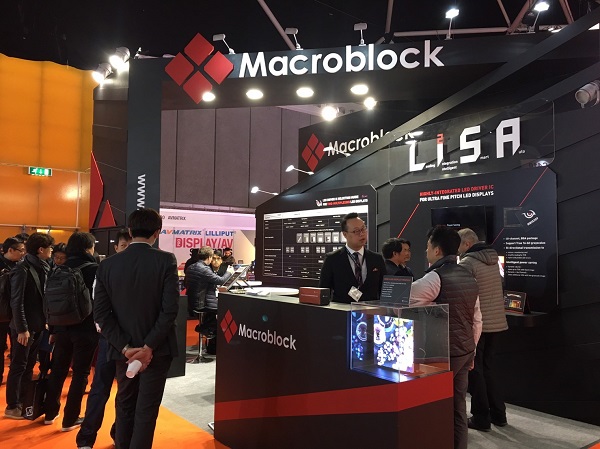 |
|
(Image: Macroblock) |
ISE 2018, the world’s largest AV system integration show kicks off today. Macroblock is to showcase its latest LED driver IC product, MBI5359—a high-integration, 48-Channel LED diver IC—suitable for ultra-fine pitch, mini-LED, and micro-LED display solutions. This demonstration is all about articulating the company's theme this year, “LI2SA” which stands for:
Leading technology,
Integration / Intelligent power saving,
Superior image, and
Auto LED failure prediction
Top 4 highlights that are a must-see:
True 16-Bit Grayscale
Macroblock is the first in the industry to debut a LED display driver IC—MBI5359— with a “True 16-Bit Grayscale.” This specific feature enhances HDR visual performance on LED displays. True 16-Bit Grayscale allows MBI5359 to deliver superior images with wide grayscales at a high refresh rate (3840Hz) with a high contrast on LED displays.
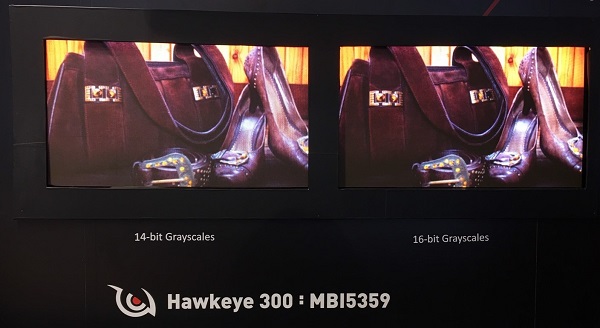 |
|
(Image: Macroblock) |
Intelligent Power Saving Mode: Dynamic Power Saving / Dynamic+ Power Saving
Macroblock’s 1st 48-Channel LED driver IC, MBI5353, features a Dynamic Power Saving function that is much appreciated among many customers for its outstanding power saving performance when showing black images or video contents. Visitors may see the power saving results through the demonstration at the booth or at other manufacturers’ booths at ISE 2018 featuring LED displays designed with MBI5353.
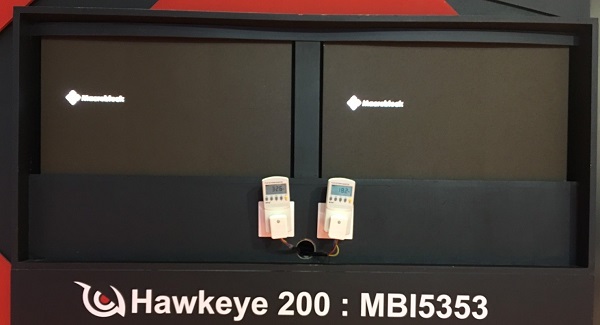 |
|
(Image: Macroblock) |
In addition, Macroblock’s newest product, MBI5359, features the Dynamic+ Power Saving function. With an even more advanced power saving mode, LED screens can now conserve energy intelligently depending on its displayed contents. Depending on the grayscale level of the displayed contents, Dynamic+ Power Saving can reduce power consumption of up to 10% when displaying still images or motion pictures. MBI5359 also retains the features of the Dynamic Power Saving function, lowering power consumption of up to 75% when the LED screen is on stand-by mode when displaying still images or videos with all black (zero grayscale level) contents.
LED Failure Prediction
As pixel pitch gets smaller, finding dead LED pixels in millions of LEDs on a LED display becomes a real headache for manufacturers and users. Besides LED error detection (i.e. detecting LED open / LED short / Pixel Short), MBI5359 can also identify failing LEDs in advance with its LED failure prediction feature. This allows manufacturers and users to monitor their LED health and status in real time.
Micro-LED Ready / Mini-LED Solution
Last but definitely not the least, MBI5359 is designed to be used for micro-LED/mini-LED display solutions (pixel pitch: 0.75mm). Considered the ultimate solution for LED displays thus far, micro-LED can be used in any sized display, whether it is for displays as large as a LED signage or as small as a screen on a wearable device.
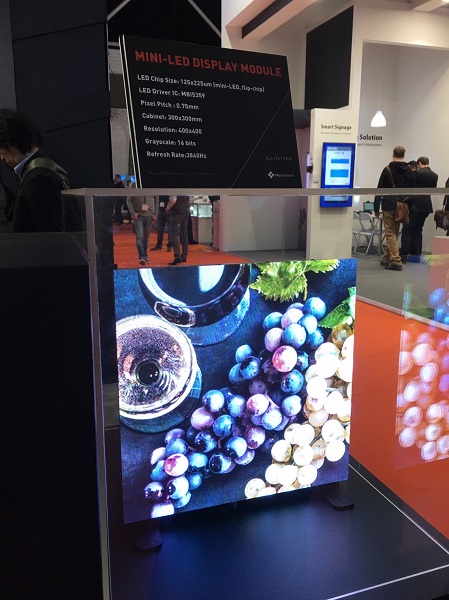 |
|
(Image: Macroblock) |
At ISE 2018, Macroblock introduces the finest micro-LED display (pixel pitch: 0.75mm) driven by MBI5359. This demonstration of a 300mmx300mm cabinet is a representation of how it can be applied to larger sized signage. As compared to a display made using SMD LED or face-up COB techniques, micro-LED displays have the advantage of being more efficient with a wider viewing angle, better reliability, moiré-free, etc. when applied to indoor signage. There is no color shift from different viewing angles or cross talk within LEDs when compared to SMD LED. The following table is a comparison between SMD LED, COB, Mini-LED, and Micro-LED.
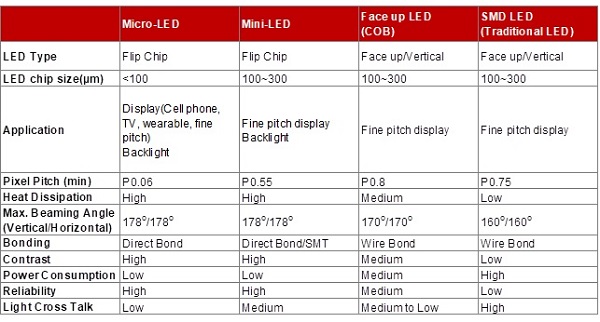 |
|
(Source: Macroblock) |
In order to increase the yield and reliability, it is necessary to repair the dead or dying LEDs. However, as pixel pitch gets smaller, detecting dead pixels in micro-LED displays with naked eyes becomes increasingly harder. With MBI5359 coming into play, one can now identify the dead pixels effortlessly and can predict dying pixels with the IC’s error detection and failure prediction features. With the bi-directional data transmission feature, there is no additional multi-functional card necessary to transmit the LED failure report data. By integrating the two most critical features to a micro-LED display—bi-directional data transmission and LED failure prediction,—a micro-LED display’s conditions are monitored effectively and thus, greatly reducing the effort in repairing and maintaining it.
















